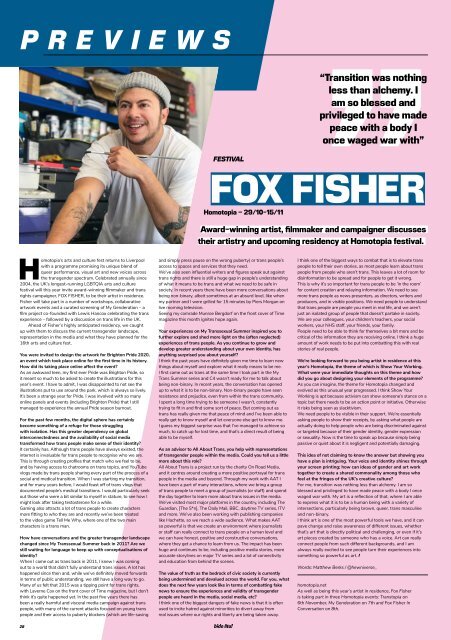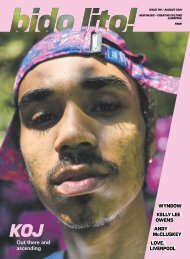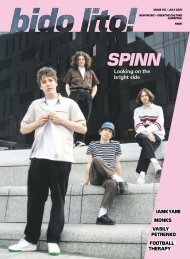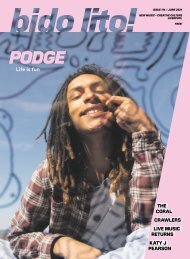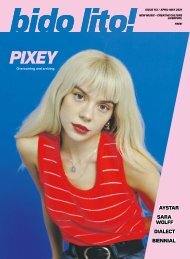Issue 111 / November 2022
November 2020 issue of Bido Lito! magazine. Featuring: COURTING, TABITHA JADE, RED RUM CLUB, THE REAL THING, MIC LOWRY, ANTHONY WILDE, STONE, BEN BURKE, FOX FISHER, SHE DREW THE GUN, THE SINGH TWINS, DON MCCULLIN and much more.
November 2020 issue of Bido Lito! magazine. Featuring: COURTING, TABITHA JADE, RED RUM CLUB, THE REAL THING, MIC LOWRY, ANTHONY WILDE, STONE, BEN BURKE, FOX FISHER, SHE DREW THE GUN, THE SINGH TWINS, DON MCCULLIN and much more.
Create successful ePaper yourself
Turn your PDF publications into a flip-book with our unique Google optimized e-Paper software.
PREVIEWS<br />
“Transition was nothing<br />
less than alchemy. I<br />
am so blessed and<br />
privileged to have made<br />
peace with a body I<br />
once waged war with”<br />
FESTIVAL<br />
FOX FISHER<br />
Homotopia – 29/10-15/11<br />
Award-winning artist, filmmaker and campaigner discusses<br />
their artistry and upcoming residency at Homotopia festival.<br />
Homotopia’s arts and culture fest returns to Liverpool<br />
with a programme promising its unique blend of<br />
queer performance, visual art and new voices across<br />
the transgender spectrum. Celebrated annually since<br />
2004, the UK’s longest-running LGBTQIA arts and culture<br />
festival will this year invite award-winning filmmaker and trans<br />
rights campaigner, FOX FISHER, to be their artist in residence.<br />
Fisher will take part in a number of workshops, collaborative<br />
artwork events and a curated screening of My Genderation – a<br />
film project co-founded with Lewis Hancox celebrating the trans<br />
experience – followed by a discussion on trans life in the UK.<br />
Ahead of Fisher’s highly anticipated residency, we caught<br />
up with them to discuss the current transgender landscape,<br />
representation in the media and what they have planned for the<br />
16th arts and culture fest.<br />
You were invited to design the artwork for Brighton Pride 2020,<br />
an event which took place online for the first time in its history.<br />
How did its taking place online affect the event?<br />
As an awkward teen, my first ever Pride was Brighton Pride, so<br />
it meant so much to be asked to create the illustrations for this<br />
year’s event. I have to admit, I was disappointed to not see the<br />
illustrations put to use around the park, which is always so lively.<br />
It’s been a strange year for Pride. I was involved with so many<br />
online panels and events (including Brighton Pride) that I still<br />
managed to experience the annual Pride season burnout.<br />
For the past few months, the digital sphere has certainly<br />
become something of a refuge for those struggling<br />
with isolation. Has this greater dependency on global<br />
interconnectedness and the availability of social media<br />
transformed how trans people make sense of their identity?<br />
It certainly has. Although trans people have always existed, the<br />
internet is invaluable for trans people to recognise who we are.<br />
This is through creating profiles that match who we feel to be,<br />
and by having access to chatrooms on trans topics, and YouTube<br />
vlogs made by trans people sharing every part of the process of a<br />
social and medical transition. When I was starting my transition,<br />
and for many years before, I would feast off of trans vlogs that<br />
documented people’s medical transitions. I would particularly seek<br />
out those who were a bit similar to myself in stature, to see how I<br />
might look after taking testosterone for a while.<br />
Gaming also attracts a lot of trans people to create characters<br />
more fitting to who they are and recently we’ve been treated<br />
to the video game Tell Me Why, where one of the two main<br />
characters is a trans man.<br />
How have conversations and the greater transgender landscape<br />
changed since My Transsexual Summer back in 2011? Are we<br />
still waiting for language to keep up with conceptualisations of<br />
identity?<br />
When I came out as trans back in 2011, I knew I was coming<br />
out to a world that didn’t fully understand trans issues. A lot has<br />
happened since then and, while we’ve definitely moved forwards<br />
in terms of public understanding, we still have a long way to go.<br />
Many of us felt that 2015 was a tipping point for trans rights,<br />
with Laverne Cox on the front cover of Time magazine, but I don’t<br />
think it’s quite happened yet. In the past five years there has<br />
been a really harmful and visceral media campaign against trans<br />
people, with many of the current attacks focused on young trans<br />
people and their access to puberty blockers (which are life-saving<br />
and simply press pause on the wrong puberty) or trans people’s<br />
access to spaces and services that they need.<br />
We’ve also seen influential writers and figures speak out against<br />
trans rights and there is still a huge gap in people’s understanding<br />
of what it means to be trans and what we need to be safe in<br />
society. In recent years there have been more conversations about<br />
being non-binary, albeit sometimes at an absurd level, like when<br />
my partner and I were grilled for 15 minutes by Piers Morgan on<br />
live morning television.<br />
Seeing my comrade Munroe Bergdorf on the front cover of Time<br />
magazine this month ignites hope again.<br />
Your experiences on My Transsexual Summer inspired you to<br />
further explore and shed more light on the (often neglected)<br />
experiences of trans people. As you continue to grow and<br />
develop greater understanding about your own identity, has<br />
anything surprised you about yourself?<br />
I think the past years have definitely given me time to learn new<br />
things about myself and explore what it really means to be me.<br />
I first came out as trans at the same time I took part in the My<br />
Trans Summer series and C4 wasn’t ready for me to talk about<br />
being non-binary. In recent years, the conversation has opened<br />
up to what it is to be non-binary. Non-binary people have seen<br />
resistance and prejudice, even from within the trans community.<br />
I spent a long time trying to be someone I wasn’t, constantly<br />
trying to fit in and find some sort of peace. But coming out as<br />
trans has really given me that peace of mind and I’ve been able to<br />
really get to know myself and let everyone else get to know me.<br />
I guess my biggest surprise was that I’ve managed to achieve so<br />
much, to catch up for lost time, and that’s a direct result of being<br />
able to be myself.<br />
As an advisor to All About Trans, you help with representations<br />
of transgender people within the media. Could you tell us a little<br />
more about this role?<br />
All About Trans is a project run by the charity On Road Media,<br />
and it centres around creating a more positive portrayal for trans<br />
people in the media and beyond. Through my work with AAT I<br />
have been a part of many interactions, where we bring a group<br />
of trans people to meet a group of journalists (or staff) and spend<br />
the day together to learn more about trans issues in the media.<br />
We’ve visited most major platforms in the country, including The<br />
Guardian, [The S*n], The Daily Mail, BBC, daytime TV series, ITV<br />
and more. We’ve also been working with publishing companies<br />
like Hachette, so we reach a wide audience. What makes AAT<br />
so powerful is that we create an environment where journalists<br />
or staff can really connect to trans people on a human level and<br />
we can have honest, positive and constructive conversations,<br />
where they get a chance to learn from us. The impact has been<br />
huge and continues to be, including positive media stories, more<br />
accurate storylines on major TV series and a lot of connectivity<br />
and education from behind the scenes.<br />
The value of truth as the bedrock of civic society is currently<br />
being undermined and devalued across the world. For you, what<br />
does the next few years look like in terms of combatting fake<br />
news to ensure the experiences and validity of transgender<br />
people are heard in the media, social media, etc?<br />
I think one of the biggest dangers of fake news is that it is often<br />
used to incite hatred against minorities to divert away from<br />
real issues where our rights and liberty are being taken away.<br />
I think one of the biggest ways to combat that is to elevate trans<br />
people to tell their own stories, as most people learn about trans<br />
people from people who aren’t trans. This leaves a lot of room for<br />
disinformation to be spread and for people to get it wrong.<br />
This is why it’s so important for trans people to be ‘in the room’<br />
for content creation and relaying information. We need to see<br />
more trans people as news presenters, as directors, writers and<br />
producers, and in visible positions. We need people to understand<br />
that trans people are people you meet in real life, and we aren’t<br />
just an isolated group of people that doesn’t partake in society.<br />
We are your colleagues, your children’s teachers, your social<br />
workers, your NHS staff, your friends, your family.<br />
People need to be able to think for themselves a bit more and be<br />
critical of the information they are receiving online. I think a huge<br />
amount of work needs to be put into combatting this with real<br />
stories of real people.<br />
We’re looking forward to you being artist in residence at this<br />
year’s Homotopia, the theme of which is Show Your Working.<br />
What were your immediate thoughts on this theme and how<br />
did you go about designing your elements of the programme?<br />
As you can imagine, the theme for Homotopia changed and<br />
evolved as this unusual year progressed. I think Show Your<br />
Working is apt because activism can show someone’s stance on a<br />
topic but there needs to be an action point or initiative. Otherwise<br />
it risks being seen as slacktivism.<br />
We need people to be visible in their support. We’re essentially<br />
asking people to show their receipts, by asking what people are<br />
actually doing to help people who are being discriminated against<br />
or targeted because of their gender identity, gender expression<br />
or sexuality. Now is the time to speak up because simply being<br />
passive or quiet about it is negligent and potentially damaging.<br />
This idea of not claiming to know the answer but showing you<br />
have a plan is intriguing. Your voice and identity shines through<br />
your screen printing; how can ideas of gender and art work<br />
together to create a shared commonality among those who<br />
feel at the fringes of the UK’s creative culture?<br />
For me, transition was nothing less than alchemy. I am so<br />
blessed and privileged to have made peace with a body I once<br />
waged war with. My art is a reflection of that, where I am able<br />
to express what it is to be a human being with a variety of<br />
intersections, particularly being brown, queer, trans masculine<br />
and non-binary.<br />
I think art is one of the most powerful tools we have, and it can<br />
pave change and raise awareness of different issues, whether<br />
that’s art that is directly political and challenging, or even if it’s<br />
art pieces created by someone who has a voice. Art can really<br />
connect people from such different backgrounds, and I am<br />
always really excited to see people turn their experiences into<br />
something so powerful as art. !<br />
Words: Matthew Berks / @hewniverse_<br />
homotopia.net<br />
As well as being this year’s artist in residence, Fox Fisher<br />
is taking part in three Homotopia events: Transtopia on<br />
6th <strong>November</strong>, My Genderation on 7th and Fox Fisher In<br />
Conversation on 8th.<br />
28


